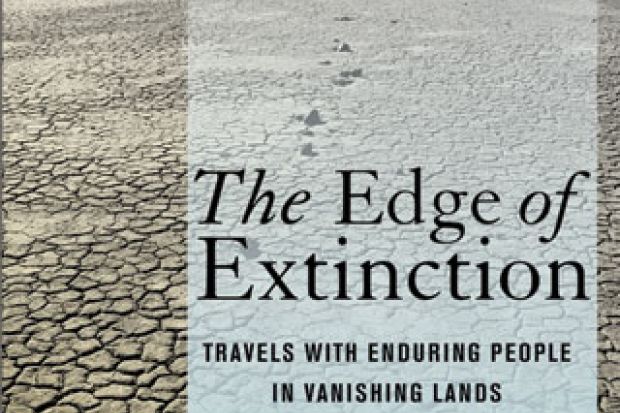A scholar with an international reputation for his work in sustainable agriculture, Jules Pretty here explores some questions of global significance. He offers a travelogue that takes in 12 locations around the world, in which he encounters a variety of precarious landscapes and peoples. Along the way, he considers what lessons we can learn about ways of life that do not threaten to undermine increasingly fragile ecosystems or reproduce the blandness of our social ambitions. If Western consumer-driven lifestyles are the enemy, the antidotes may lie in the cultures founded and sustained on different sets of values. Although it would be easy for Pretty to be didactic, his messages here are more elusive. This is both the book’s strength and its weakness. There is a sense of something very important here without it ever coming fully into focus.
The Edge of Extinction lies between general interest and academic travel narratives, and comparable ground has recently been trodden by Robert Macfarlane in The Old Ways: A Journey on Foot and George Monbiot in Feral: Searching for Enchantment on the Frontiers of Rewilding. Those authors succeed more clearly, perhaps because of the less ambiguous nature of their endeavours: mainstream books that demand less of their readers but are not necessarily the worse for it. Reading Pretty’s book, I wanted him to hold back less, and to set out the lessons just a little more explicitly.
Pretty writes beautifully of the places and people he meets, albeit elliptically at times, slowly building up layers of history, ecology, topography and culture. He is particularly good on the subtleties and varieties of fauna, and complex interrelationships that build up over time and are increasingly threatened. The people Pretty encounters, though, come out less successfully. Traditional cultures, and the terrible injustices visited upon them in times past and present, are prominent within the narrative, but the individuals he meets and travels with are more thinly sketched. The book feels less about these people and more about their histories and the places they try to cling on to.
The ambitions of The Edge of Extinction are most fully and successfully realised in a chapter on Amish farming communities in Ohio. It is the most peopled and ethnographically rich discussion in the book, and it is also clear that, in discussing Amish farming practices, Pretty is dealing with material with which he is most familiar and informed. Reading this, there is a sense of how specific knowledge and practices from this community could be instituted more widely. He presents ideas, often modest ones, that work in environmental, economic and social senses and which, with a little imagination, could be deployed elsewhere. This is the challenge that other chapters in the book allude to but do not resolve.
A wealth of ecological and cultural wisdom emerges in each of these chapters, and this is the book’s primary contribution. But there are other questions that these insights prompt, about the specificity of such bodies of knowledge, the challenges they raise for our prevailing cultural, economic and policy frameworks, and how these seemingly exclusive ways of being might encounter each other in ways that are not alien and destructive but rather cooperative and respectful. Disappointingly, Pretty has less to say here. These silences within the text would be less problematic if it were not for the lurking sense that these are actually Pretty’s ambitions in undertaking this project.
This book is a pleasure to read, but primarily as a travelogue rather than as eco-philosophy. It feels a little disappointing to take this away from a work that appears to have grander ambitions. Pretty rejects the colonialism inherent in even the more informed literatures of unequal encounter. While this is noble and right, perhaps the urgency of the issues that swirl around The Edge of Extinction demand that these engagements are addressed a little less obliquely than they are here.
The Edge of Extinction: Travels with Enduring People in Vanishing Lands
By Jules Pretty
Comstock Publishing Associates/Cornell University Press, 240pp, £17.50
ISBN 9780801453304
Published 20 November 2014
Register to continue
Why register?
- Registration is free and only takes a moment
- Once registered, you can read 3 articles a month
- Sign up for our newsletter
Subscribe
Or subscribe for unlimited access to:
- Unlimited access to news, views, insights & reviews
- Digital editions
- Digital access to THE’s university and college rankings analysis
Already registered or a current subscriber? Login





